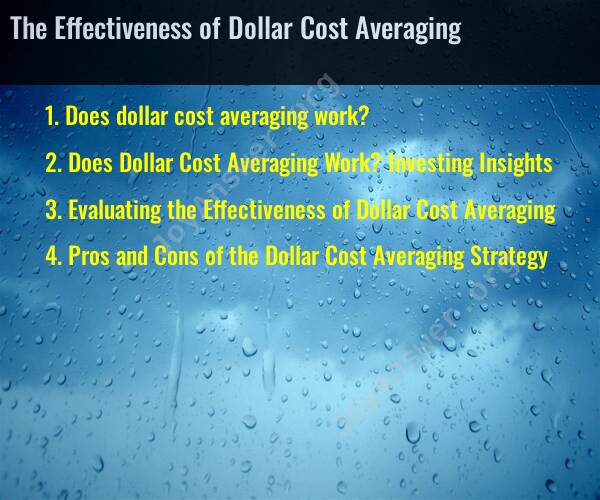Does dollar cost averaging work?
Dollar cost averaging (DCA) is a commonly used investment strategy, and its effectiveness depends on various factors, including your investment goals, time horizon, risk tolerance, and the specific market conditions. Here are some key points to consider regarding the effectiveness of dollar cost averaging:
Advantages of Dollar Cost Averaging:
Reduces Market Timing Risk: DCA eliminates the need to predict or time the market, which can be challenging even for experienced investors. By investing a fixed amount at regular intervals, you can avoid the risk of making a lump-sum investment just before a market downturn.
Emphasizes Discipline: DCA encourages a disciplined and systematic approach to investing. This can help you avoid impulsive decisions based on short-term market fluctuations or emotions.
Mitigates Volatility: DCA allows you to buy more shares when prices are low and fewer shares when prices are high. Over time, this can result in a lower average purchase price, which can be advantageous during market fluctuations.
Spreads Risk Over Time: By investing incrementally, you spread your risk over multiple transactions, reducing the impact of a single large investment that might be subject to market volatility.
Psychological Benefits: DCA can provide peace of mind for investors who are uncomfortable with the idea of making a lump-sum investment. It can help ease anxiety and concerns about market timing.
Considerations and Limitations:
Potential Opportunity Cost: DCA may result in missed opportunities for higher returns in a strongly upward-trending market. If the market consistently performs well, a lump-sum investment could outperform DCA.
No Guarantee of Profit: DCA does not guarantee a profit, and the overall performance of your investments depends on the performance of the underlying assets.
Transaction Costs: Frequent transactions associated with DCA can lead to higher transaction costs, such as brokerage fees, which can affect your overall returns.
Suitability for Long-Term Goals: DCA is typically better suited for long-term investment goals. If you have short-term financial objectives, other strategies may be more appropriate.
Asset Selection Matters: The effectiveness of DCA also depends on the assets or investments you are dollar-cost averaging into. Some assets may experience higher volatility than others.
In summary, dollar cost averaging can be an effective strategy for many investors, particularly those with long-term investment goals and a desire for a disciplined approach to investing. It can help reduce market timing risk and encourage consistency in your investment activities. However, it is not a one-size-fits-all solution, and its effectiveness can vary depending on individual circumstances and market conditions. Consider consulting with a financial advisor or investment professional to determine whether DCA is suitable for your specific financial situation and goals.
Does Dollar Cost Averaging Work? Investing Insights
Dollar-cost averaging (DCA) is an investment strategy in which an investor invests a fixed amount of money at regular intervals, regardless of the price of the investment. This can be a good way to reduce the impact of volatility on the overall cost of your investments. However, it is important to consider your individual investment goals and risk tolerance when deciding whether or not to use dollar-cost averaging.
DCA has been shown to be effective in reducing the overall cost of an investment over time. For example, a study by Vanguard found that investors who used DCA to invest in the S&P 500 over a 30-year period had a lower average cost per share than investors who invested a lump sum at the beginning of the period.
However, it is important to note that DCA does not guarantee profits. The performance of your investments will still depend on the underlying market conditions. Additionally, DCA can be less effective in volatile markets, as the price of the investment may fluctuate wildly between investment intervals.
Evaluating the Effectiveness of Dollar Cost Averaging
The effectiveness of dollar-cost averaging depends on a number of factors, including the investment horizon, the volatility of the investment, and the frequency of investments.
In general, dollar-cost averaging is more effective for long-term investors. This is because the market has historically trended upwards over the long term, so investors who dollar-cost average are more likely to buy more shares when prices are low and fewer shares when prices are high.
Dollar-cost averaging can also be effective for investors who are investing in volatile markets. This is because dollar-cost averaging can help to reduce the overall cost of the investment by buying more shares when prices are low.
However, the frequency of investments can also affect the effectiveness of dollar-cost averaging. Investors who invest more frequently will have a lower average cost per share than investors who invest less frequently. This is because investors who invest more frequently are more likely to buy shares when prices are low.
Pros and Cons of the Dollar Cost Averaging Strategy:
Pros of dollar-cost averaging:
- Reduces the impact of volatility on the overall cost of investments.
- Can be a good way to invest in volatile markets.
- Is a simple and easy-to-implement strategy.
- Can help investors to discipline themselves and invest regularly.
Cons of dollar-cost averaging:
- Does not guarantee profits.
- Can be less effective in the short term.
- May not be the best strategy for investors who need to access their money in the short term.
Overall, dollar-cost averaging can be a good investment strategy for investors who are investing for the long term and who are comfortable with volatility. However, it is important to consider your individual investment goals and risk tolerance when deciding whether or not to use dollar-cost averaging. You should also speak with a financial advisor to develop an investment strategy that is right for you.












